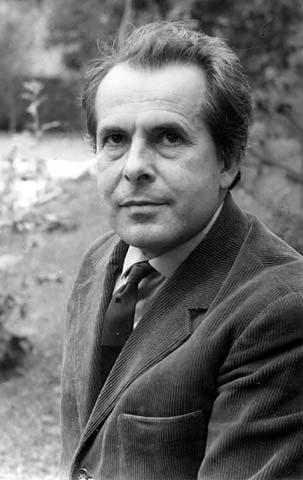Csorba Győző: Biography
Győző Csorba (Pécs, 21 November 1916 – Pécs, 13 September 1995)
Kossuth Prize-winning Hungarian poet, literary translator. He was elected a posthumous member of the Digital Literature Academy in 2000.
*
He was born in Pécs on 21 November 1916 and died there on 13 September 1995 after a serious illness. He never left his native town for more than half a year at a time. He wrote of Pécs in his poem Séta és meditáció (Walking and Meditation): ‘For me, the CITY forever.’
He grew up in a big family, and was the eighth of nine siblings. Poverty was a defining experience in his life until the late 1950s.
In 1935 he graduated from the Jesuit grammar school, and in 1939 he obtained a degree in political science and a doctorate from the Faculty of Law at the University of Pécs. During his secondary school and university years, he tutored underachieving students, wrote theses for money, supported himself, and often even helped his family with their financial problems.
In November 1944 he married Margit Velényi, his companion and support until his death. They had three daughters and seven grandchildren.
He was a graduate without a job from 1939 to 1941, and a municipal clerk in the office of the Governor General from 1941 to 1943. From 1943 to 1952, he was head of the Pécs City Library, during which time he was repeatedly called back to his former job for longer or shorter periods to perform administrative duties. From 1952 to 1956 he was the head of the Baranya County Library, and then deputy director from 1956 to 1976, and after his retirement he worked in the library until 1993. He was never a ‘freelancer’, a permanent job guaranteed him the security to provide for his family.
His poetry began at the same time as that of the third generation of the Nyugat literary journal. His first poems appeared in 1933-1934 in the student magazines A Mi Utunk and Regnum. In 1935 his poems were published for the first time in a volume, in the anthology Százhúrú hegedű (Hundred-Stringed Violin). In 1938 he self-published his first book of poems, Mozdulatlanság (Immobility), and in 1940 his first book of translations, A halál versei (The Poems of Death) by Helinant de Froidmont, translated from the Old French.
He published 16 poetry collections, 8 volumes of selected works, and in 1978 his Összegyűjtött versek (Collected Poems).
His posthumous collection Hátrahagyott versek (Poems Left Behind) was published by his heirs in 2000.
His poetry focuses on the soul, life and death, family and garden. He also wrote ‘public sphere’ poems, but his lyrics did not deal with political issues. He was a poet with a distinctive voice and an individual path. His monographer Tibor Tüskés wrote of him: ‘A deep and authentic emotional base and an up-and-coming control of the intellect: this duality gives his poetry its distinctive flavour, its individual character, its unsettling tension.’
One of his closest friends and fellow poets, Sándor Weöres, summarized in 1978: ‘In Győző Csorba I saw the absolutely true poet, the absolute lyricist without a single lie… In the family circle of Pécs, in his social solitude, he works for eternity.’
A significant part of his work was as a translator: in addition to a large number of Latin, German, Italian, French and Russian translations, he is also known for his Greek, Polish, Norwegian and Finnish translations. He made several study trips abroad, first to Italy in 1947–1948, where he was a resident at the Hungarian Academy in Rome for 5 months. After translating the second book of Goethe's Faust into Hungarian (1959), he became one of Janus Pannonius’ most renowned translators. He published his own volume of Janus translations, Pajzán epigrammák (Risqué Epigrams, 1986), and edited a Janus volume, Janus Pannonius válogatott munkái (Selected Works of Janus Pannonius, 1982). His volume of selected translations of poetry, Kettőshangzat(Dichotomy, 1976), contains a selection of poems by 61 poets in Hungarian: in addition to Goethe and Janus Pannonius, most of the poems are by Dante, Petrarch and Rilke. Three of his dramatic translations were also published in a separate volume.
His work as a literary organiser is extremely wide-ranging. He was one of the main figures in the literary life of Pécs, playing a significant role in the editing of all the literary journals of Pécs, and helping young writers and poets with his advice and rigorous criticism. His organizing and editing activities began in 1940, when he was accepted into the Janus Pannonius Society of Pécs. In 1941 he became a member of the editorial board of the journal Sorsunk. From 1946 to 1948, until the journal’s closure, he was co-editor.
From 1948, he was a member of the Hungarian Writers’ Association. In 1949, he took part in editing the journal Dunántúl. From 1959 he worked in the editorial office of Jelenkor, which he left of his own accord in 1965. He returned to the editorial board of Jelenkor in 1977, and as long as he was fit to work, he continued to work there.
In 1985 he was awarded the Kossuth Prize, a prize that had never been awarded to a poet from the countryside before. In 1995 he was admitted to the Széchenyi Academy of Literature and Arts.
According to his bibliographer László Bertók, ‘Győző Csorba has been a hallmark of Pécs literature and culture for half a century with his art, his writing workshop and his human attitude’.
The biography was written by László Pintér, translated by Benedek Totth and Austin Wagner.

